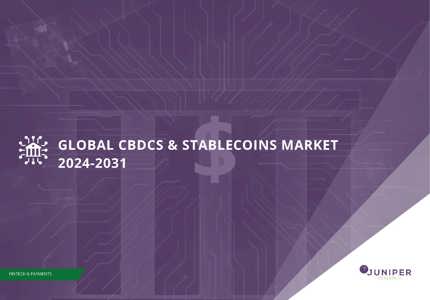US Election Results: What Do They Mean for Fintech & Payments?
Donald Trump’s second term is set to begin in January 2025. In this blog, we dive into the cryptocurrency and regulatory reforms he has promised - and how these might impact key fintech and payments markets.
How Will the Digital Currency Markets Be Affected?
The election of a pro-crypto president has ignited strong optimism in the cryptocurrency market. In the week since Donald Trump has been announced as the election winner, Bitcoin’s price surged 80%; reaching an all-time high of over $88,000. Donald Trump’s vocal support of cryptocurrency, such as his vow to make the US the “crypto capital of the world” and proposing the creation of a national bitcoin reserve, have reinforced expectations of a more favourable regulatory environment for digital assets in the US.
Currently, the US cryptocurrency sector is experiencing a lack of clarity regarding the legal classification of cryptocurrencies. The SEC (Securities and Exchange Commission) has pursued lawsuits against several prominent cryptocurrency companies, including Ripple and Binance, based on the premise that a cryptocurrency is a security.
Trump has promised to demote the current chair of the SEC, Gary Gensler, which would clear the way for a more crypto-friendly appointee to advocate for clearer favourable regulations tailored to the crypto industry. While it is not yet clear if Trump has the power to do so, it signals his intent to reduce legal pressures on crypto firms, paving the way for industry growth.
In opposition to his positive view on cryptocurrencies, Trump’s presidency currently opposes CBDC (Central Bank Decentralised Currencies) implementation; potentially delaying ‘digital dollar’ development indefinitely. His support for the CBDC Anti-Surveillance State Act, which requires congressional approval for the Federal Reserve to issue a CBDC, suggests that he rejects CBDCs on the grounds of personal privacy infringements.
Reduced Regulatory Oversight
Trump’s stance on financial regulation is centred around reducing the reach of regulatory authorities; aiming to ease compliance burdens on financial institutions and fintechs.
One of Trump’s plans is to repeal the Biden Executive Order on Artificial Intelligence. Biden’s order established the AISI (AI Safety Institute) requiring companies to submit reports about how their AIs were being trained and the security measures being taken to reduce risk. Without this order, companies can innovate with lower operational costs, but they may be exposed to more risks such as data privacy issues and cybersecurity threats.
The Donald Trump presidency could lead to a more complex landscape for Open Banking in the US, driven by potential roll-back of regulatory provisions such as the Dodd-Frank Act. The Dodd-Frank Act tightly regulates the financial sector systems that were believed to have contributed to the 2008 financial crisis.
Section 1033 of this Act requires financial service providers to provide consumers and authorised third parties with access to their financial data, thus facilitating Open Banking. In his first term as President, Trump moved to roll back the Dodd-Frank Act; easing restrictions in the financial industry. If Trump continues to weaken the Dodd-Frank Act in his second term, this may delay Open Banking efforts; potentially complicating market entry for fintech firms focused on data-driven services.
Long-term Weakening of the Role of the Dollar in International Trade
Finally, the protectionist tariffs suggested by Trump may drive countries to diversify trade partnerships and reduce their reliance on the US. This could lead to an increased use of alternative currencies in international trade; weakening the dollar’s role as the dominant reserve currency.
This comes alongside efforts by the BRICS nations to establish an alternative to current cross-border systems, as well as individual efforts by countries such as China to popularise their own currencies. As such, there is the risk that deploying tariffs at scale will accelerate the move away from the dollar.
Uncertainty Will Delay Decision Making
Ultimately, the election of President Trump creates significant uncertainty around the future of the US economy broadly, as well as the way payments and fintechs operate. In the short to medium term, we believe this will likely restrict investment in the US market, while the dust settles. However, we believe the US market will remain highly lucrative, with any changes creating fresh opportunities for innovation.
Lorien is a Research Analyst in the Fintech and Payments team at Juniper Research, and specialises in analysing and forecasting emerging trends and innovations in financial markets. Her latest reports have covered topics including CBDCs & Stablecoins, eCommerce Payments, and Modern Card Issuing Platforms.
Latest research, whitepapers & press releases
-
 ReportMarch 2026Fintech & PaymentsCross-border Payments Market: 2026-2030
ReportMarch 2026Fintech & PaymentsCross-border Payments Market: 2026-2030Our Cross-border Payments research suite provides a comprehensive and in-depth analysis of the evolving cross-border payments landscape; enabling stakeholders such as businesses, financial institutions, payment service providers, card networks, regulators, and technology infrastructure providers to understand future growth, key trends, and the competitive environment.
VIEW -
 ReportFebruary 2026Telecoms & ConnectivityMobile Messaging Market: 2026-2030
ReportFebruary 2026Telecoms & ConnectivityMobile Messaging Market: 2026-2030Juniper Research’s Mobile Messaging research suite provides mobile messaging vendors, mobile network operators, and enterprises with intelligence on how to capitalise on changing market dynamics within the mobile messaging market.
VIEW -
 ReportFebruary 2026Fintech & PaymentsKYC/KYB Systems Market: 2026-2030
ReportFebruary 2026Fintech & PaymentsKYC/KYB Systems Market: 2026-2030Our KYC/KYB Systems research suite provides a detailed and insightful analysis of an evolving market; enabling stakeholders such as financial institutions, eCommerce platforms, regulatory agencies and technology vendors to understand future growth, key trends and the competitive environment.
VIEW -
 ReportFebruary 2026Telecoms & ConnectivityRCS for Business Market: 2026-2030
ReportFebruary 2026Telecoms & ConnectivityRCS for Business Market: 2026-2030Our comprehensive RCS for Business research suite provides an in‑depth evaluation of a market poised for rapid expansion over the next five years. It equips stakeholders with clear insight into the most significant opportunities emerging over the next two years.
VIEW -
 ReportFebruary 2026Fintech & PaymentsMobile Money in Emerging Markets: 2026-2030
ReportFebruary 2026Fintech & PaymentsMobile Money in Emerging Markets: 2026-2030Our Mobile Money in Emerging Markets research report provides detailed evaluation and analysis of the ways in which the mobile financial services space is evolving and developing.
VIEW -
 ReportJanuary 2026IoT & Emerging TechnologyPost-quantum Cryptography Market: 2026-2035
ReportJanuary 2026IoT & Emerging TechnologyPost-quantum Cryptography Market: 2026-2035Juniper Research’s Post-quantum Cryptography (PQC) research suite provides a comprehensive and insightful analysis of this market; enabling stakeholders, including PQC-enabled platform providers, specialists, cybersecurity consultancies, and many others, to understand future growth, key trends, and the competitive environment.
VIEW
-
 WhitepaperMarch 2026Telecoms & Connectivity
WhitepaperMarch 2026Telecoms & ConnectivityMWC 2026: What's Next for Mobile?
Our latest whitepaper distils the most important announcements from MWC Barcelona 2026 and examines what they mean for the telecoms market over the year ahead. From network APIs and 5G monetisation to AI-RAN, direct-to-cell connectivity, and 5G-Advanced, it explains where the biggest opportunities — and challenges — will emerge next.
VIEW -
 WhitepaperMarch 2026Fintech & Payments
WhitepaperMarch 2026Fintech & PaymentsThe Transformation of Cross-border Payment Infrastructure
Our complimentary whitepaper, The Transformation of Cross-border Payment Infrastructure, examines the state of the cross-border payments market; explaining the role of key actors in transforming the cross-border payment experience, as well as the current landscape and recent developments within the cross-border payments industry.
VIEW -
 WhitepaperFebruary 2026Telecoms & Connectivity
WhitepaperFebruary 2026Telecoms & ConnectivityHow Social Media Will Disrupt Mobile Messaging Channels in 2026
Our complimentary whitepaper, How Social Media Will Disrupt Mobile Messaging Channels in 2026, explores the challenges and opportunities for operators and enterprises as social media traffic continues to increase.
VIEW -
 WhitepaperFebruary 2026Telecoms & Connectivity
WhitepaperFebruary 2026Telecoms & ConnectivityProtecting Users from Scam Ads: A Call for Social Media Platform Accountability
In this new whitepaper commissioned by Revolut, Juniper Research examines how scam advertising has become embedded across major social media platforms, quantifies the scale of user exposure and financial harm, and explains why current detection and enforcement measures are failing to keep pace.
VIEW -
 WhitepaperFebruary 2026Fintech & Payments
WhitepaperFebruary 2026Fintech & PaymentsKnow Your Agents (KYA): The Next Frontier in KYC/KYB Systems
Our complimentary whitepaper, Know Your Agents (KYA): The Next Frontier in KYC/KYB Systems, examines the state of the KYC/KYB systems market; considering the impact of regulatory development, emerging risk factors such as identity enabled fraud, and how identity and business verification is evolving beyond traditional customer and merchant onboarding toward agent-level governance.
VIEW -
 WhitepaperFebruary 2026Telecoms & Connectivity
WhitepaperFebruary 2026Telecoms & Connectivity3 Key Strategies for Capitalising on RCS Growth in 2026
Our complimentary whitepaper, 3 Key Strategies for Capitalising on RCS Growth in 2026, explores key trends shaping the RCS for Business market and outlines how mobile operators and platforms can accelerate adoption and maximise revenue over the next 12 months.
VIEW
-
Fintech & Payments
Top Three Global Leaders in Cross-border Payment Infrastructure Revealed
March 2026 -
Telecoms & Connectivity
MVNO Subscriber Revenue to Exceed $50 Billion Globally in 2030
March 2026 -
Fintech & Payments
QUBE Events is excited to bring back the 24th NextGen Payments & RegTech Forum - Switzerland
February 2026 -
Telecoms & Connectivity
OTT Messaging Apps to Exceed 5 Billion Users Globally by 2028; Driving Shift in Enterprise Communication Strategies
February 2026 -
Fintech & Payments
Calling All Fintech & Payment Innovators: Future Digital Awards Now Open for 2026
February 2026 -
Telecoms & Connectivity
Operator RCS for Business Revenue to Reach $3 Billion Globally by 2027, Growing 150% in Two Years
February 2026





















